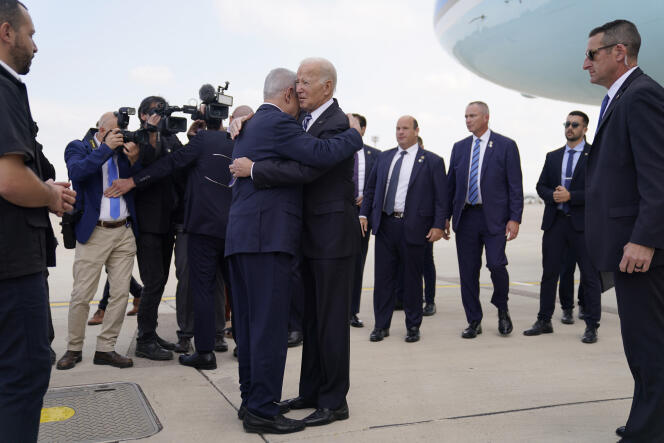


US President Joe Biden, trying to be an attentive ear for Israel and delicately warn Prime Minister Benjamin Netanyahu of the risks of a ground offensive in Gaza, is walking a tightrope. After a summit between Biden and Arab leaders was called off, the US president has arrived in Israel on Wednesday, October 18, for an express visit to Tel Aviv. Israeli Prime Minister Benjamin Netanyahu personally welcomed Biden on the tarmac, putting his arms around the US president who then clasped his hands around Netanyahu in a sign of the newfound bond between the two leaders. Under unusually tight security even for the US president, Biden and Netanyahu chatted briefly on the tarmac at Ben Gurion Airport surrounded by their guards before their motorcades set off for a Tel Aviv hotel where they will hold talks.
The Hamas attack on Israel is the third major international crisis managed by the Biden administration. The first was the chaotic and largely improvised military withdrawal from Afghanistan in August 2021. The second crisis was Russia's invasion of Ukraine in February 2022. Despite the immense stakes of these diplomatic crises, and the many lives that hang in the balance because of them, none has quite shaken the White House as much as Hamas's attack on October 7.
The cold rationality and pragmatism of the administration's experienced officials were suddenly overwhelmed by emotion. It was an intense time. Its crisis management method was multi-dimensional, with a belated reminder of international humanitarian law. It left the United States at odds in the Middle East, bitterly opposed to what it perceived as a partisan commitment to Israel, with no real concern for the fate of Palestinian civilians.
"The presidential model for Biden in his reaction is not Obama, but Clinton," said Aaron David Miller, a veteran Middle East diplomat and analyst at the Carnegie Endowment for International Peace think tank. "The grief Clinton felt after the assassination of Yitzhak Rabin [an Israeli prime minister killed by a Jewish extremist in 1995] is the grief Biden feels. His love for the idea of Israel and his regard for its security are firmly embedded in his political and emotional DNA."
On October 9, John Kirby, the spokesperson for the National Security Council, broke down on CNN. The former Rear Admiral, who spent 28 years in uniform in the Navy, is known for his public speaking skills, often handling White House communications on international issues. But on Monday, 48 hours after the devastating Hamas raid, Kirby was unable to find his words to talk about the victims. "These are human beings. They're family members, they're friends, they're loved ones, cousins, brothers, sisters. Yeah, it's difficult and I apologize," he said on air.
You have 67.02% of this article left to read. The rest is for subscribers only.
